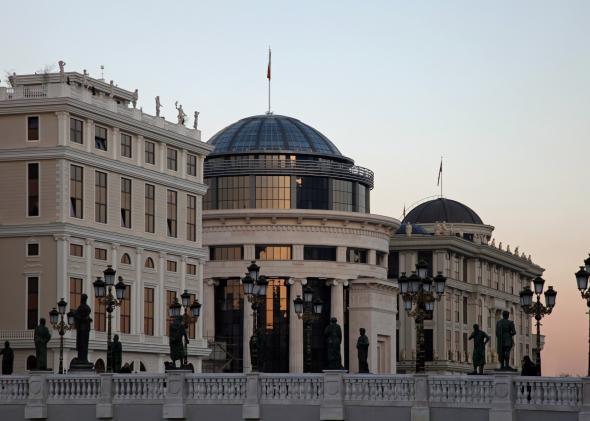For the third time since it came to power in 2006, Macedonia’s ruling faction is trying to amend the nation’s constitution to outlaw same-sex marriage. Amendment 33 would also prohibit civil unions or any other registered form of life partnership for same-sex couples.
Should the efforts of the ominously named Internal Macedonian Revolutionary Organization—Democratic Party for Macedonian National Unity, known by the less imposing initialism VMRO, be successful, Macedonia would join Serbia and Montenegro as constituents of the former Yugoslavia that have exclusivist constitutional restrictions.
These exclusively heterosexual definitions might also contravene European law. The European Convention on Human Rights, to which Macedonia is party, contains articles respecting the right to private and family life and the enjoyment of that right free from discrimination. Last year, in the case of Vallianatos and Others v. Greece, the court ruled that the blanket exclusion of same-sex couples from registering a civil union in Greece violated those articles.
LGBTQ organizations, including LGBT United Macedonia and EGAL, have not pressed the government for marriage equality. However, they and the main opposition party, the Social Democratic Union of Macedonia, fear that restrictions on the definition of a legal union will exclude same-sex couples from having the private or family life they desire, institutionalize discrimination against LGBTQ people, and birth greater intolerance within Macedonian society.
Since 2006, the focus of the VMRO, a conservative, nationalist faction, has been on reconstructing Macedonian identity with a focus on ethno-nationalism and the family. This has included turning the capital, Skopje, into the Las Vegas of Macedonian nationalism, bedazzling the Brutalist cityscape with Neoclassical edifices and gaudy statues of heroes on horseback.
For LGBTQ Macedonians, VMRO rule has meant a neglect of their basic rights, in spite of the determination of the government to become part of the Euro-Atlantic family of nations via the European Union and NATO. It is still legal to discriminate on the grounds of sexual orientation and gender identity in employment and access to goods and services; there is no law on hate speech or hate crimes based on sexual orientation or gender identity; and no national policy for tackling such hate.
Anti-discrimination legislation passed in 2010 does not refer explicitly to sexual orientation, although the government claims lesbian, gay, and bisexual Macedonians are covered within the legislation under “other grounds.” This, in spite of the fact that countries that wish to join the European Union are expected to introduce a comprehensive anti-discrimination law providing protection from discrimination on the grounds of age, ethnic origin, disability, religion, race, and sexual orientation.
Queer Macedonians’ place in public life is precarious. Gay rights group ILGA-Europe’s annual report on Macedonia documented several physical attacks on LGBTQ people. In 2013, the Skopje LGBTI Center was attacked on three occasions. In March, stones were thrown at demonstrators; in June, the venue was set upon by a mob armed with glass bottles, steel pipes, and pyrotechnic materials; and in July, attackers climbed on the building’s roof at night, poured flammable liquid beneath the tiles, and set it ablaze.
LGBTQ activists have also been assaulted in the streets. Activists carrying flags and placards and handing out posters in the centre of Bitola—Macedonia’s second city, located in the south of the country—were attacked last year. The assailants later posted a photo of the activists they attacked on Facebook with the message, “Never again will faggots step foot in Bitola.”
Such attacks, and a failure to prosecute those responsible, fit a pattern seen across most of the former Yugoslavia. The offices of Libertas—an LGBTQ drop-in center in Pristina, Kosovo—were attacked in December 2012 and subsequently closed. That same month, a party organized by Kosovo 2.0 magazine to celebrate its Sex Issue was shut down after Islamist thugs smashed up the venue. Sarajevo’s LGBTQ film festival was stormed by masked men in February of this year, and three attendees were injured. Faced with such naked hostility, gay life in the region is often hidden from public view.
The ruling VMRO party has done nothing to alter the state of public discourse in Macedonia. The most recent local election campaign in April 2013 was marked by the use of homophobic and transphobic insults, which, Bekim Asani, chair of LGBT United Macedonia has said, were an “attempt to distract people from the real problems in the country.”
“Homophobia is being used as a political weapon reflecting a wider pattern of LGBT victimization in Macedonia,” British human rights activist Peter Tatchell told Gay Star News. “It is one of the most regressive anti-gay regimes in Europe. LGBT activists in Macedonia are working in conditions of extreme anti-gay hostility. They are heroes and heroines of the global struggle for queer freedom.”
The European Parliament’s Intergroup on LGBT Rights has called for Macedonia’s “anti-discrimination legislation to be brought in line with EU law” and on “political and societal leaders to condemn homophobic and transphobic violence.” But the VMRO is once again pursuing a constitutional amendment on marriage, not only because it is in some way woven into the party’s ethno-nationalist, pro-family ideology, but because in Macedonia, homophobic and transphobic legislation and speech pay political dividends.
